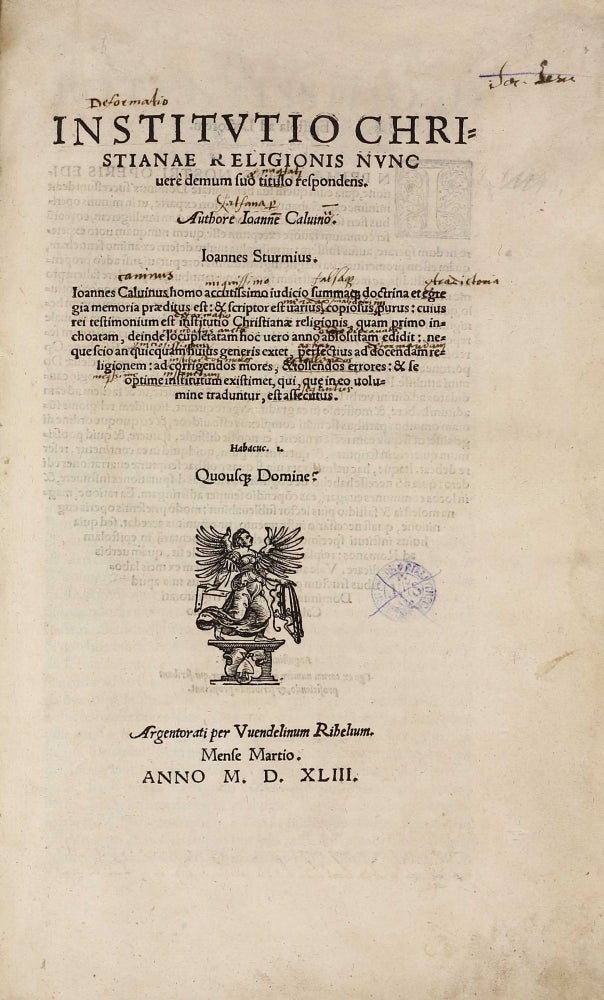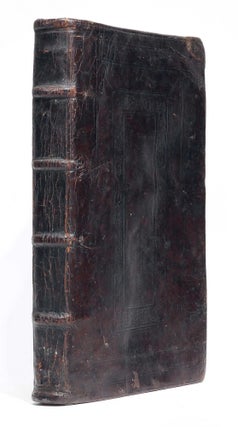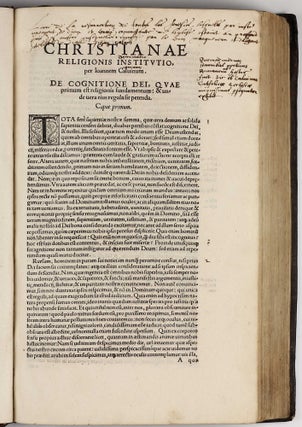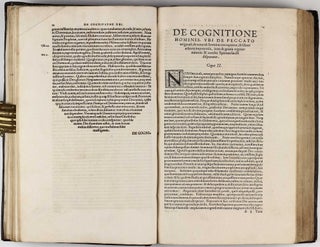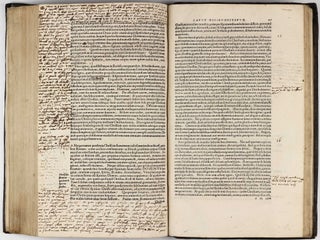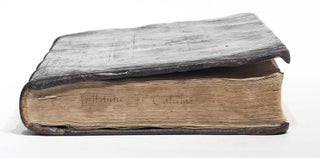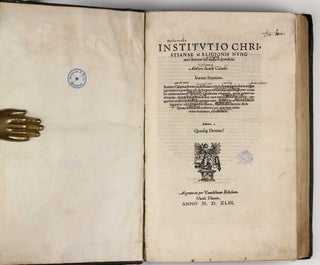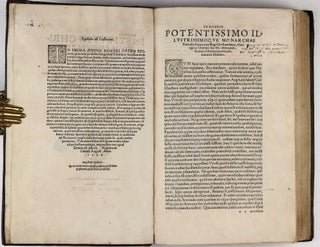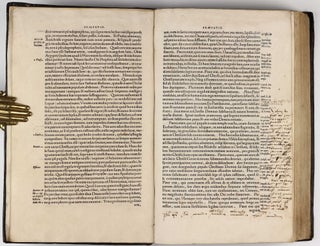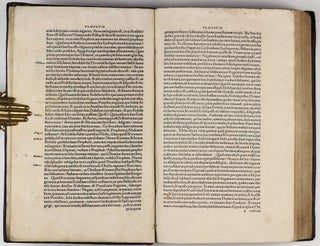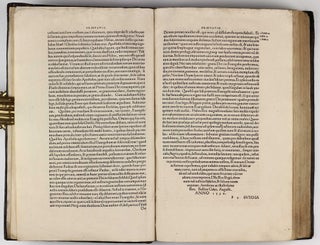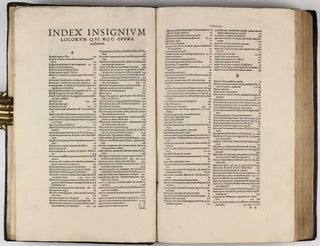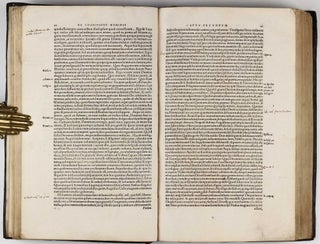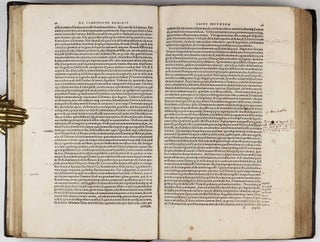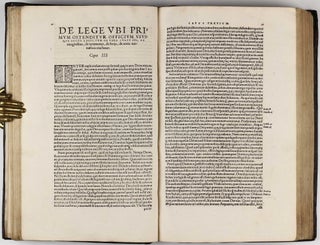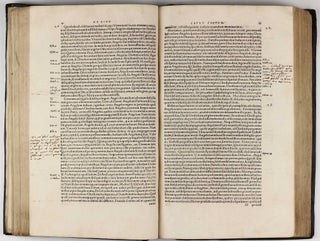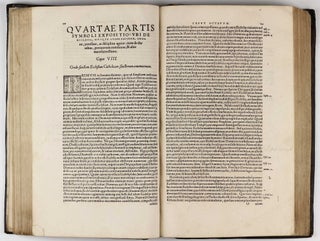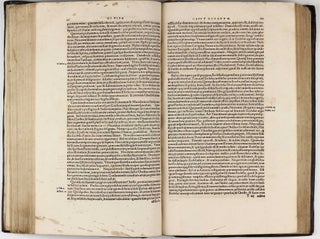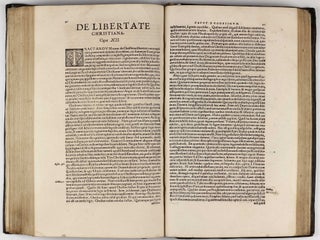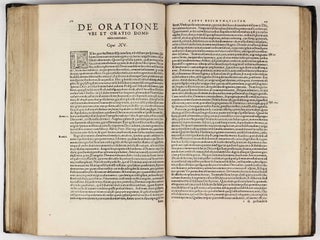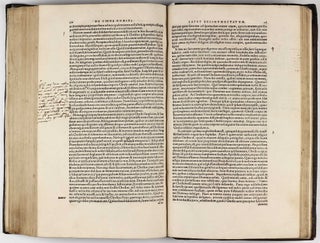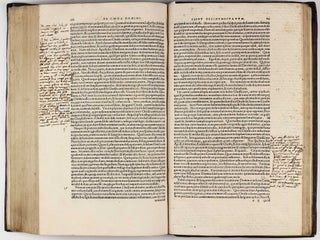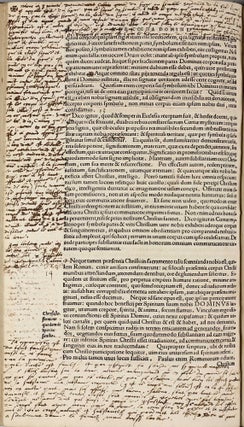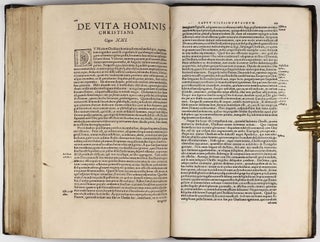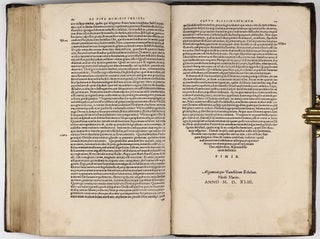The most important doctrinal work of the Reformation in the earliest accessible edition
Institutio Christianae religionis : nunc uerè demum suo titulo respondens.
Strassburg: Wendelin Rihel, 1543.
3rd Edition. Hardcover. Very Good. Item #003097
Folio (327 x 202 mm). [44], 505, [3] pp. Signatures: [alpha]-[gamma]6 [delta]4 A-Z6 a-s6 t-v4. Includes title-page woodcut vignette (printer's device) and woodcut initials in text. Leaf [delta]4 and v4 are blanks. Title-page bears an encomium from Johannes Sturm: "Ioannes Sturmius. Ioannes Caluinus homo accutissimo iudicio summaq[ue] doctrina et egregia memoria praeditus est ... ad corrigendos mores, & tollendos errores: & se optime institutum existimet, qui, qu[a]e in eo uolumine traduntur, est assecutus." With printed marginalia. Marks of contraction in encomium have been expanded. Includes index. Bound in contemporary blind-stamped polished calf over thin wooden boards, spine with 4 raised bands (boards somewhat warped, slight cracking of leather, upper corners heavily scuffed). Upper edge of book block with hand lettering. Only very little browning of text, light dust-soiling, occasional very minor spotting, paper repair to upper blank margin of first 7 leaves and flyleaf (not affecting text), faint ink smudges to p.321/22, several pages with extensive ink marginalia in contemporary hand. A very good, wide-margined copy in original binding. ----
EXCEPTIONALLY RARE THIRD EDITION in Latin, the second Strassburg (Argentorati) print by Rihel, edited by J. Sturm. The first edition of 1536 and the second of 1539 are both virtually unobtainable. "Calvin's Institution of the Christian Religion was the first systematic statement of a Reformed Church. It is the most important doctrinal work of the Reformation as a whole and provided a comprehensive theological system rivaling those of the Middle Ages". (Printing and the Mind of Man 65).
Jean Calvin was a student of law and then classics at the University of Paris. Around 1533 he became involved in religious controversies and converted to Protestantism, a new Christian reform movement which was persecuted by the Catholic Church in France, forcing him to go into hiding. He moved to Basel, Switzerland, for safety in 1535, and around this time he must have begun writing a summary of theology which would become the Institutes. His Catholic opponents sought to tie him and his associates (known as Huguenots in France) to groups of radical Anabaptists, some of which had been put down by persecution. He decided to adapt the work he had been writing to the purpose of defending Protestants suffering from persecution from false accusations that they were espousing radical and heretical doctrines. The work, written in Latin, was published in Basel in March 1536 with a preface addressed to King Francis I of France, entreating him to give the Protestants a hearing rather than continue to persecute them. It is six chapters long, covering the basics of Christian creed using the familiar catechetical structure of the Ten Commandments, the Apostles' Creed, the Lord's Prayer, and the sacraments, as well as a chapter on Christian liberty and political theology. Soon after publishing it, Calvin began his ministry in Geneva, Switzerland. The Institutes proved instantly popular, with many asking for a revised edition. In 1539, Calvin published a much larger work, with seventeen chapters of about the same length as the six chapters of the first edition. It includes many references to classical authors and Church fathers, as well as many additional references to the Bible. Calvin's epistle to the reader indicates that the new work is intended for theological students preparing for ministry. Four chapters were added in a third edition in 1543, and a 1550 edition was published with only minor changes. The fifth and final edition with which Calvin was involved, and which is used by scholars as the authoritative text, is 80% larger than the previous edition and was published in Geneva in 1559. There is some speculation that Calvin may have translated the first edition into French soon after its publication, but the earliest edition which has survived is Calvin's 1541 translation. It was primarily intended for French-speaking Swiss, since very few copies were able to be smuggled into France. Some of these were publicly burned in front of Notre-Dame Cathedral soon after their publication. The Institutes overshadowed the earlier Protestant theologies such as Melanchthon's Loci Communes and Zwingli's Commentary on the True and False Religion. According to historian Philip Schaff, it is a classic of theology at the level of Origen's On First Principles, Augustine's The City of God, Thomas Aquinas's Summa Theologica, and Schleiermacher's The Christian Faith. (Wiki).
Sold
Delivery time up to 10 days. For calculation of the latest delivery date, follow the link: Delivery times
Lieferzeit max. 10 Tage. Zur Berechnung des spätesten Liefertermins siehe hier: Lieferzeiten


